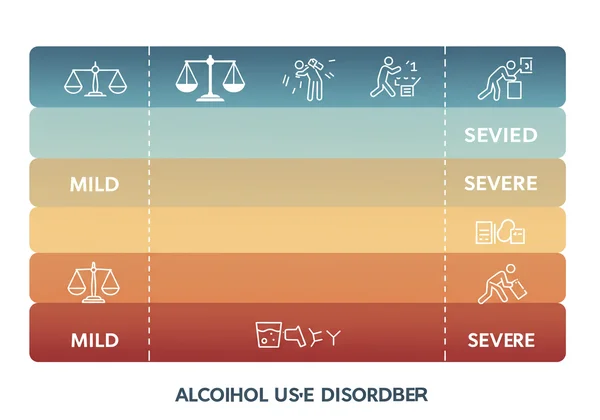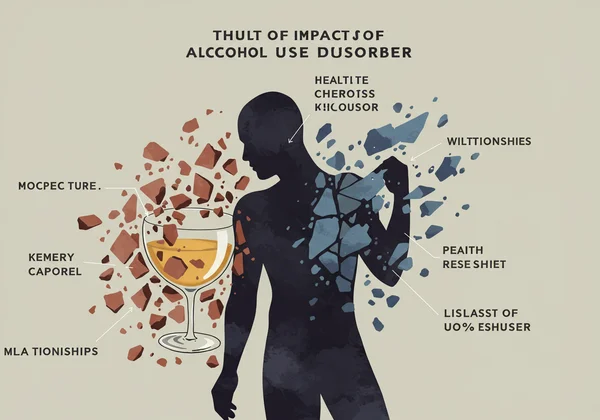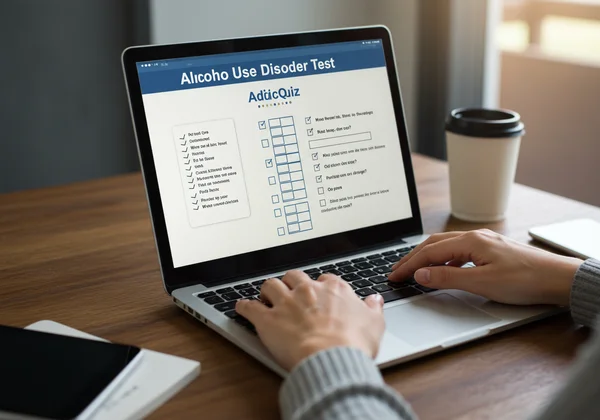Is My Drinking a Problem? Alcohol Addiction Test & Signs
September 2, 2025 | By Juliana Pace
Are you questioning your relationship with alcohol? It's a thought that crosses many minds, often in the quiet moments after a night out or during a stressful week. Many people wonder if their drinking habits have crossed an invisible line from social to problematic. If you're asking, "Is my drinking a problem?", you've already taken a courageous first step towards self-awareness. This article is here to help you understand the recognized signs of Alcohol Use Disorder (AUD) based on scientific criteria and guide you toward a confidential self-assessment. Taking an alcohol addiction test can be a private, insightful way to get clarity.

Understanding Alcohol Use Disorder (AUD)
Before we explore the specific signs, it's important to understand the clinical term for what is often called alcoholism or alcohol addiction: Alcohol Use Disorder (AUD). This is a medical condition characterized by an impaired ability to stop or control alcohol use despite adverse social, occupational, or health consequences. It's not a moral failing or a lack of willpower; it's a recognized medical condition that can be managed. Gaining this perspective helps remove stigma and opens the door to understanding.
What is "Problem Drinking" vs. AUD?
The line between casual drinking, problem drinking, and Alcohol Use Disorder can seem blurry. "Problem drinking" generally refers to patterns of alcohol consumption that result in negative consequences but don't yet meet the full clinical criteria for AUD. For example, it might involve binge drinking on weekends, leading to arguments or poor performance at work the next day. AUD, on the other hand, is diagnosed when a person meets specific criteria outlined in the Diagnostic and Statistical Manual of Mental Disorders (DSM-5), indicating a more compulsive and persistent pattern of use.
The Spectrum of Alcohol Use Disorder: Mild, Moderate, or Severe
It's crucial to recognize that AUD exists on a spectrum. Based on the number of diagnostic criteria a person meets, their condition can be classified as mild, moderate, or severe. This spectrum approach helps professionals tailor treatment and acknowledges that not everyone's experience with alcohol problems is the same. Understanding this can be empowering, as it shows that even early signs are valid and worth addressing before they potentially escalate. A confidential online addiction test can help you see where your habits might fall on this spectrum.

7 Key Signs of Alcohol Use Disorder (Based on DSM-5 Criteria)
So, what are the specific signs of alcoholism that health professionals look for? These seven criteria, adapted from the DSM-5, are strong indicators that a person's drinking habits may have developed into AUD. Reflect honestly on whether these experiences feel familiar to you.

Loss of Control Over Drinking
This is a cornerstone of AUD. It means you often drink more alcohol or for a longer period than you originally intended. You might tell yourself you'll only have one drink but end up having several. This loss of control is not about being irresponsible; it reflects changes in the brain's reward and self-control pathways caused by prolonged alcohol use.
Developing Tolerance to Alcohol
Have you noticed that you need to drink more than you used to in order to feel the same effects? This is known as developing tolerance. As your body adapts to the presence of alcohol, it requires larger quantities to achieve the desired level of intoxication. Conversely, some people find that the same amount of alcohol has significantly less effect than it once did.
Experiencing Withdrawal Symptoms
When you reduce or stop drinking after a period of heavy use, do you experience physical or emotional discomfort? These are withdrawal symptoms. They can include anxiety, shakiness, sweating, nausea, headaches, or insomnia. In severe cases, withdrawal can be dangerous. The presence of these symptoms is a clear sign of physical dependence.
Neglecting Responsibilities Due to Alcohol Use
A significant red flag is when drinking starts to interfere with your major responsibilities. This could mean missing work or school, neglecting family or children, or seeing a decline in your performance in these areas. If alcohol is taking precedence over your commitments, it's a strong indicator of a developing problem. An addiction test can help you evaluate this impact.
Continuing to Drink Despite Negative Consequences
Perhaps your drinking has caused or worsened a health problem, like liver issues or depression. Maybe it has led to relationship conflicts or legal trouble, such as a DUI. A key sign of AUD is continuing to drink even when you are fully aware that it is causing or exacerbating these persistent problems. This highlights the compulsive nature of the condition.
Strong Cravings for Alcohol
Do you experience intense urges or cravings to drink? These cravings can be so powerful that you find it difficult to think about anything else. They can be triggered by certain places, people, or emotions. This psychological pull is a major component of AUD and makes it challenging to cut back.
Failed Attempts to Cut Down or Stop Drinking
You may have a persistent desire to reduce your alcohol consumption and may have tried to do so one or more times without success. You might set rules for yourself, like only drinking on weekends, but find yourself unable to stick to them. These unsuccessful efforts are a common and often frustrating sign that your drinking is no longer fully within your control.
When to Consider a Confidential Alcohol Addiction Test Online
If you recognize yourself in several of the signs described above, it can feel overwhelming. But remember, awareness is the first step toward change. You don't have to have all the answers right now. This is exactly when an online addiction test can be a valuable tool for gaining initial clarity in a safe, judgment-free environment.
The Benefits of a Private Self-Assessment
One of the biggest barriers to understanding one's drinking habits is the fear of judgment. The beauty of an online self-assessment is its complete privacy and anonymity. You can answer questions honestly without fear of anyone else knowing. This process allows for genuine self-reflection and provides immediate, science-based feedback to help you understand your level of risk. A free addiction quiz is a no-pressure way to start.

Your Next Step: Taking the AUDIT Test on Our Platform
Our platform uses the Alcohol Use Disorders Identification Test (AUDIT), a simple 10-question screening tool developed by the World Health Organization (WHO). It is one of the most accurate and widely used alcohol screening instruments in the world. Taking this test on our addiction test platform is free, confidential, and takes only a few minutes. It will provide you with a score that helps identify whether your alcohol consumption may be harmful.
Taking the First Step: Understanding Your Relationship with Alcohol
Acknowledging that you have questions about your drinking is a significant and positive move. It's about taking control of your health and well-being. By learning the signs of Alcohol Use Disorder and considering a confidential screening, you are empowering yourself with knowledge. This journey is about understanding, not judgment.
Remember, every journey begins with one step. If you're ready to gain a clearer perspective on your drinking habits and take charge, we invite you to take our free test – a confidential, science-backed tool designed to empower your next move.

Frequently Asked Questions About Alcohol Use & Addiction
How can I know if my drinking is truly a problem?
The surest way to know is by evaluating its impact on your life. If you identify with the signs listed above, such as loss of control, neglecting responsibilities, or failed attempts to cut back, it indicates a potential problem. A validated screening tool, like the AUDIT test offered on our platform, can provide objective feedback based on your personal consumption patterns.
What are the 4 C's of addiction in relation to alcohol?
The 4 C's are a simple way to remember the core components of addiction: Craving (an intense urge to drink), loss of Control (inability to stop once you start), Compulsion (continuing to drink despite negative consequences), and Continued use (using despite the harm it causes). If these resonate with you, it's a strong sign to seek further evaluation.
Can you test for alcohol addiction online safely and accurately?
Yes, online screening tests like the AUDIT are highly accurate and reliable tools for identifying at-risk drinking patterns. They are not a medical diagnosis but are designed to be a safe, confidential first step. On our platform, we prioritize your privacy, requiring no registration to get your confidential results.
What are the early signs of problem drinking?
Early signs often include a noticeable increase in tolerance, drinking to cope with stress or emotions, experiencing regular hangovers, and feeling guilt or shame about your drinking. You might also find yourself making excuses for your drinking or becoming irritable when you can't drink.
Is alcohol addiction considered a mental illness?
Yes, Alcohol Use Disorder is classified as a substance use disorder in the DSM-5, which is a recognized category of mental health conditions. Viewing it as a medical and mental health issue, rather than a choice, is essential for effective, compassionate treatment and recovery.
Disclaimer: This article is for informational purposes only and does not constitute medical advice. The screening tools on AddictionTest.me are not a substitute for a professional diagnosis. If you are concerned about your drinking, please consult a healthcare professional or a qualified therapist.